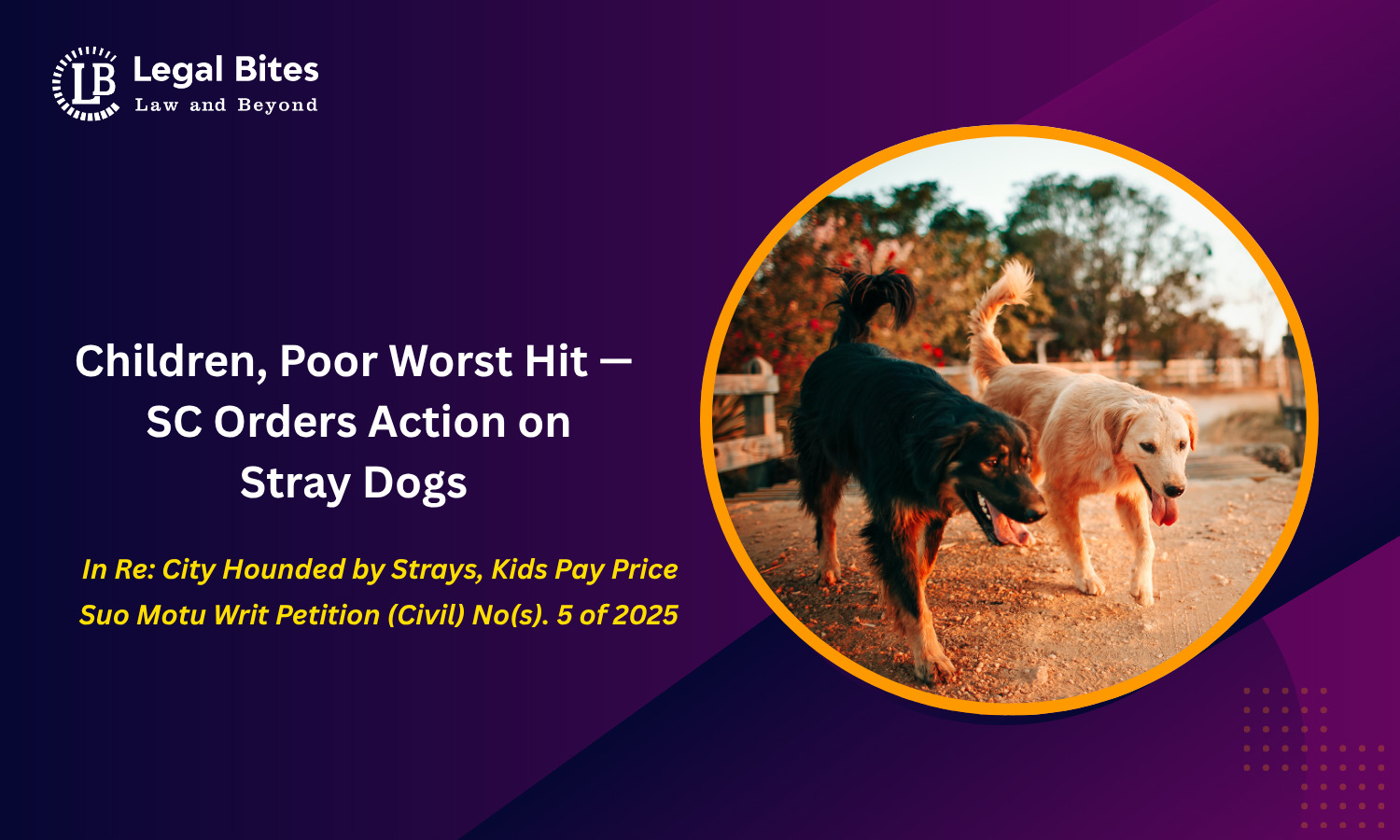
Taking suo motu cognizance of the alarming rise in stray dog attacks and road accidents caused by stray animals, the Supreme Court—through a bench of Justices Vikram Nath, Sandeep Mehta, and N.V. Anjaria—has issued sweeping directions to all States, Union Territories, and statutory bodies, emphasising both public safety and animal welfare. The case titled “In Re: City Hounded by Strays, Kids Pay Price” stemmed from growing public concern and disturbing incidents reported across India.
Major Takeaways from the Supreme Court’s Order
1. Nationwide Implementation of Animal Birth Control Rules
The Court reaffirmed that municipal authorities must capture, sterilise, deworm, and vaccinate stray dogs in accordance with the Animal Birth Control Rules, 2023, and release only the healthy and non-aggressive dogs back to their original localities. It warned that non-compliance or lethargy by States will be viewed seriously.
2. Public Safety and Highway Directions
The Court extended its concern beyond stray dogs to include cattle and other stray animals on highways, calling such accidents a “constitutional failure” under Article 21.
It directed:
- Complete removal of cattle/stray animals from highways and expressways.
- Formation of joint patrol teams and helpline numbers for quick response.
- Accountability of officers for lapses, with mandatory compliance affidavits from Chief Secretaries and NHAI.
3. Institutional Areas Under Scrutiny
The Court observed a “disturbing increase in dog-bite incidents” in schools, hospitals, sports complexes, and transport hubs, noting that children, patients, and the poor suffer most.
Examples Cited:
- Wayanad (Kerala): A student bitten inside a classroom.
- Hisar (Haryana): Six students attacked in a government school.
- KGMU Lucknow & IMH Chennai: Doctors and patients mauled inside hospital premises.
- Jawaharlal Nehru Stadium, Delhi: Foreign coaches bitten during a global athletics event.
- Kannur & Alappuzha Railway Stations: Dozens bitten, some by rabid dogs
4. Directions for Educational, Health, and Public Institutions
For All States and UTs
- Identify every school, hospital, stadium, bus depot, and railway station within two weeks.
- Secure premises with fencing and gates under the supervision of the District Magistrate.
- Appoint Nodal Officers for the maintenance and prevention of stray dog entry.
- Conduct quarterly inspections to ensure no dog habitats exist within campuses.
- Remove and shelter stray dogs from institutional areas—not to be released back.
- Ensure a constant stock of anti-rabies vaccines and immunoglobulin at all hospitals.
- Launch awareness sessions in schools on first aid and safe behaviour with animals
5. For the Centre and Key Ministries
- Ministries of Health, Education, Animal Husbandry, Youth Affairs, Railways, and Road Transport must ensure compliance within eight weeks.
- The Animal Welfare Board of India is to frame Standard Operating Procedures (SOPs) for the prevention and management of stray dogs in institutional areas.
6. The Court’s Rationale
The Bench noted that:
- India continues to record one of the world’s highest rabies-related deaths, with 90% caused by dog bites.
- The menace is not limited to slums but affects tourists, students, and professionals alike.
- The persistence of stray dog attacks represents administrative apathy and violation of the right to life under Article 21.
- Humane treatment of animals must coexist with the protection of citizens’ safety.
6. Compliance and Accountability
- Chief Secretaries of all States/UTs and relevant Ministries to file affidavits within 8 weeks.
- Animal Welfare Board to report on sterilisation drives and SOPs.
- Any non-compliance may trigger suo motu contempt proceedings.
- Next hearing scheduled on January 13, 2026.
Conclusion
The Supreme Court’s order is both a wake-up call and a roadmap. It underscores the need for coordinated, humane, yet decisive measures to prevent the stray dog crisis from escalating further. The Court’s insistence on balancing compassion with accountability reaffirms that public safety is non-negotiable, and governance failures will not go unchecked.
Important Link
Law Library: Notes and Study Material for LLB, LLM, Judiciary, and Entrance Exams